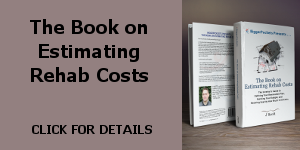My dad called me the other day…he was reading my blog and following my real estate adventure, and was curious about something:
When you’re new to buying apartments, how can you confidently determine a reasonable price for a particular property?
Surprisingly, it’s quite simple (it often requires a lot of work, but it’s not complicated). Unlike single family homes, which are priced based on what other similar properties are selling for (and can therefore be very subjective), the fair price of an apartment building is directly correlated with the amount of income the property produces. If you remember from my financial tutorial and from my discussion of the “Golden Ratio,” the following formula applies to multi-unit properties:
Price = NOI / Cap Rate
In other words, to figure out a fair price for an apartment building (or for any income producing asset, for that matter, such as a business), all you need to know is the Net Operating Income (NOI) and the Capitalization Rate. Let’s start with how you figure out the Cap Rate for your equation…
Remember that Cap Rate is the rate of return you could expect from the property if you paid cash for it and owned it outright. Just a bank account might return 3% annually, a Certificate of Deposit (CD) might return 5% annually, and the stock market might return on-average 7% annually, your property will theoretically return a certain percentage as well. This is the Cap Rate.
Cap Rates generally vary by location, type of property, condition of property, etc. Cap Rates in New York City, for example, could be as low as 4-5% (because of historic value of real estate in that area and all the competition to buy it). Cap Rates in parts of Iowa might be closer to 14%, because when an owner wants to sell a building, he likely has less buyer competition and therefore needs to provide a better deal to potential buyers. Likewise, a new (or newly renovated) building is likely to have a lower Cap Rate than a building that needs a lot of improvements — this is because a building in perfect shape provides much less hassle for a buyer, and with less work/risk comes less reward.
By speaking with local brokers and investigating recent property sales, you can get an idea of exactly what range of Cap Rates to expect in your area.
Next you need to determine the NOI for the property you’re considering. As we discussed in the financial tutorial, NOI is total income the property produces minus the total expenses incurred to own the property. Accurately determining NOI can be time consuming and difficult, but it’s an extremely important step before — and after — making an offer on a property.
So, let’s say you have your Cap Rate and your NOI. For this example, let’s assume the property you’re considering has an annual income of $140,000 and annual expenses of $65,000, for an NOI of $75,000. And let’s assume you live in an area with an average Cap Rate of 10% (while rates have been creeping downward the past couple years due to more buyer competition, this isn’t an unreasonable rate for a typical building in a typical metro area).
Using those numbers, our example property would have a fair value of:
Price = NOI / Cap Rate = $75,000 / 10% = $750,000
The fair value of the building based on the current Cap Rate and current NOI is $750K.
Pulling in some concepts that we’ve discussed previously, let’s see how you make money off this property…
Of course, you have a plan to improve the operations for the building (remember the Value Play), and for the sake of this example, you believe you can improve the NOI of the property to $85,000 (by increasing income and/or decreasing expenses) in one year.
After that one year, the value (and fair price) of the property has increased to:
Price = NOI / Cap Rate = $85,000 / 10% = $850,000
So, by paying a fair price for the building, and improving its financial fundamentals, you can sell it for a now-higher fair price, and keep the difference (in this case $100,000). Of course, if you can buy the building below fair price and/or sell it above its fair price, you stand to make even more money.




What’s been your experience asking agents about the cap rates for the areas?
Every time I’ve asked (and it has been many many times) I get answers like “it depends” or “they are all over the place” (meaning: I don’t know or I won’t tell you).
I don’t generally trust what agents say, not so much because I think they’re lying, but more because I think they have no idea.
I actually had the opportunity to have lunch with a big Atlanta apartment investor the other day, and that was one of the very first questions I asked him.
He believes that downtown Atlanta is seeing cap rates around 7% (with some decent properties closer to 8%), and also believes this number is on the rise. Of course, each locale is going to vary, but that seems like a reasonable estimate for the downtown area. I’m not really sure what to expect from the surrounding metro area, though.
Did he elaborated on why he thought cap rates were on the rise? I’d assume the lending market has big influence here, but I’m curious on his reasoning about this.
That’s a good question, and I didn’t ask…but I will!